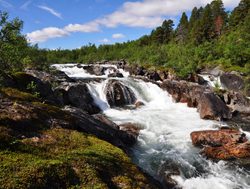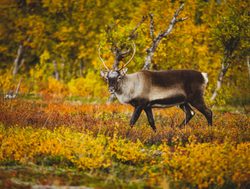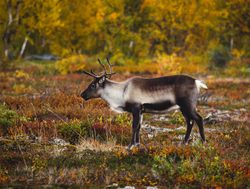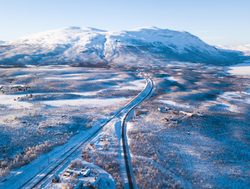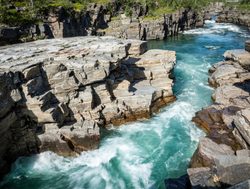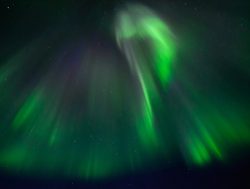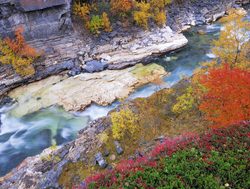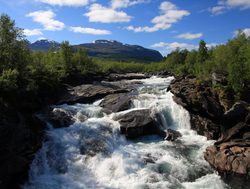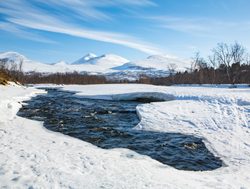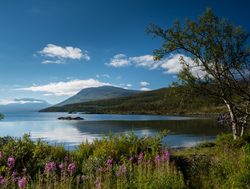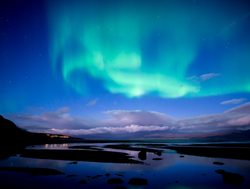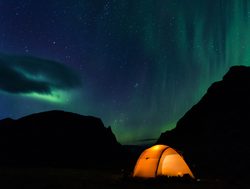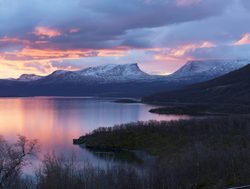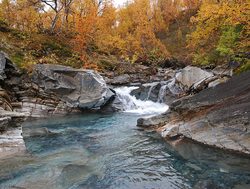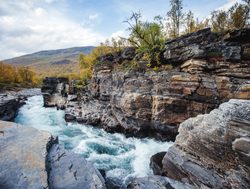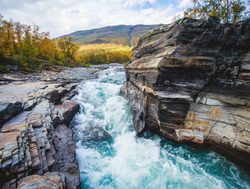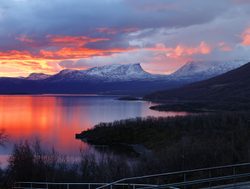
Quick Navigation
Abisko National Park is located in the far northern part of Sweden, with only Vadvetjakka National Park being further north. It rests near the border of Norway. The park covers an area of 30 square miles (77 sq km).
The park extends from Tornetrask Lake up through 121 miles (195 km) inside the Arctic Circle. The town of Abisko is located along the lake and serves as the namesake of the national park.
A frozen terrain known as permafrost is commonly found throughout the park. The landscapes are blanketed with flowering alpine meadows during the summer and winter wonderlands during the rest of the year.
The Abiskodalen valley is nestled in between striking mountains that are collectively creating some of the most stunning landscapes. The birch forest delivers enchanting shades of yellow, red, and orange while coloring the mountains.
Highlights
One of the highlights of the park is the two extreme lighting conditions. The summer months deliver a season of eternal sunshine. The park is more renowned for its winter activities, but it provides excellent opportunities to experience nature both seasons.
Midnight Sun
The midnight sun is a natural condition that occurs in both polar circles. The southern hemisphere delivers the eternal sunshine for 24 hours around the summer solstice, which occurs in late December. Here in Abisko, the midnight sun is part of the northern hemisphere, which delivers the 24 hours of sunshine in later June around the 21st.
Long mostly sunlit days occur while approaching this date as well as afterward, with each day getting a little less dark as the season progresses. It is a phenomenon that is intriguing to many people, even though it creates a challenge to the sleep schedule.
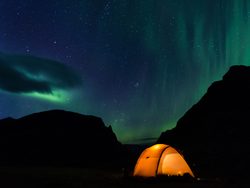 Polar Nights
Polar Nights
The polar nights represent the opposite season as the midnight sun. Here in Abisko, the longest dark day occurs in late December around the 23rd. During these 24 hours, the sun stays below the horizon for the entire day. It begins to show more and more each day following this period until it reaches the longest sunlit day noted above. One of the highlights about this season is that it provides significantly more darkness, which creates better chances for seeing and experiencing the aurora borealis.
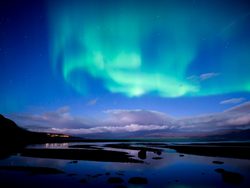 Aurora Borealis
Aurora Borealis
The aurora borealis is also affectionately known as the “northern lights.” Although this light phenomenon occurs in the Antarctic circle, it is most commonly experienced around the Arctic Circle. This is one of the best places to see the northern lights.
The aurora borealis is a naturally occurring display of lights across the sky. The lights may appear as streaks, waves, curtains, or blobs. In each case, most people would describe them as dancing lights that decorate the skies.
The colors may vary, but you may see red, green, blue, ultraviolet, pink, and yellow. Seeing these lights is many bucket lists, and Abisko is a great place to try and experience them.
Abisko National Park Trails
The park is popular for cross-country skiing and snowshoeing, which leverage many of the trails that are traditionally hiked during the summer months.
Park Protection
Abisko National Park was created to protect the nature of the northern Nordic region that displayed the original natural facets characteristic of the area. It was also created to secure a beautiful region of terrain which may be shared with eco-friendly tourism opportunities.
The Abisko Scientific Research Station studies the landscapes and ecosystem as well as the effects of the warming temperatures that are being experienced in the area. The station researches from a biological, ecological, environmental, and geological perspective. Climate change and effects are a crucial part of the study undertaken.
Abisko Highlights
- Midnight Sun
- Polar Nights
- Aurora Borealis
Park Map
Sources
- All Trails, Best Trails In Abisko National Park, https://www.alltrails.com/parks/sweden/norrbotten/abisko-national-park, retrieved August 2020.
- Lights Over Lapland, 3 Reasons You Should Visit Abisko National Park to Observe the Aurora Borealis, https://lightsoverlapland.com/3-reasons-why-you-should-visit-abisko-national-park-to-observe-the-aurora-borealis/, retrieved August 2020.
- National Parks of Sweden, Abisko National Park, http://www.nationalparksofsweden.se/choose-park---list/abisko-national-park/, retrieved August 2020.
- Nordic Visitor, Abisko National Park, https://lapland.nordicvisitor.com/travel-guide/attractions/abisko-national-park/, retrieved August 2020.
- Swedish Lapland, World’s Best Place for Northern Lights, https://www.swedishlapland.com/stories/abisko-worlds-best-place-for-northern-lights/, retrieved August 2020.
- Visit Abisko, Discover the Abisko Area, https://www.visitabisko.com, retrieved August 2020.
- Wikipedia, Aurora, https://en.wikipedia.org/wiki/Aurora, retrieved August 2020.
- Wikipedia, Midnight Sun, https://en.wikipedia.org/wiki/Midnight_sun, retrieved August 2020.
